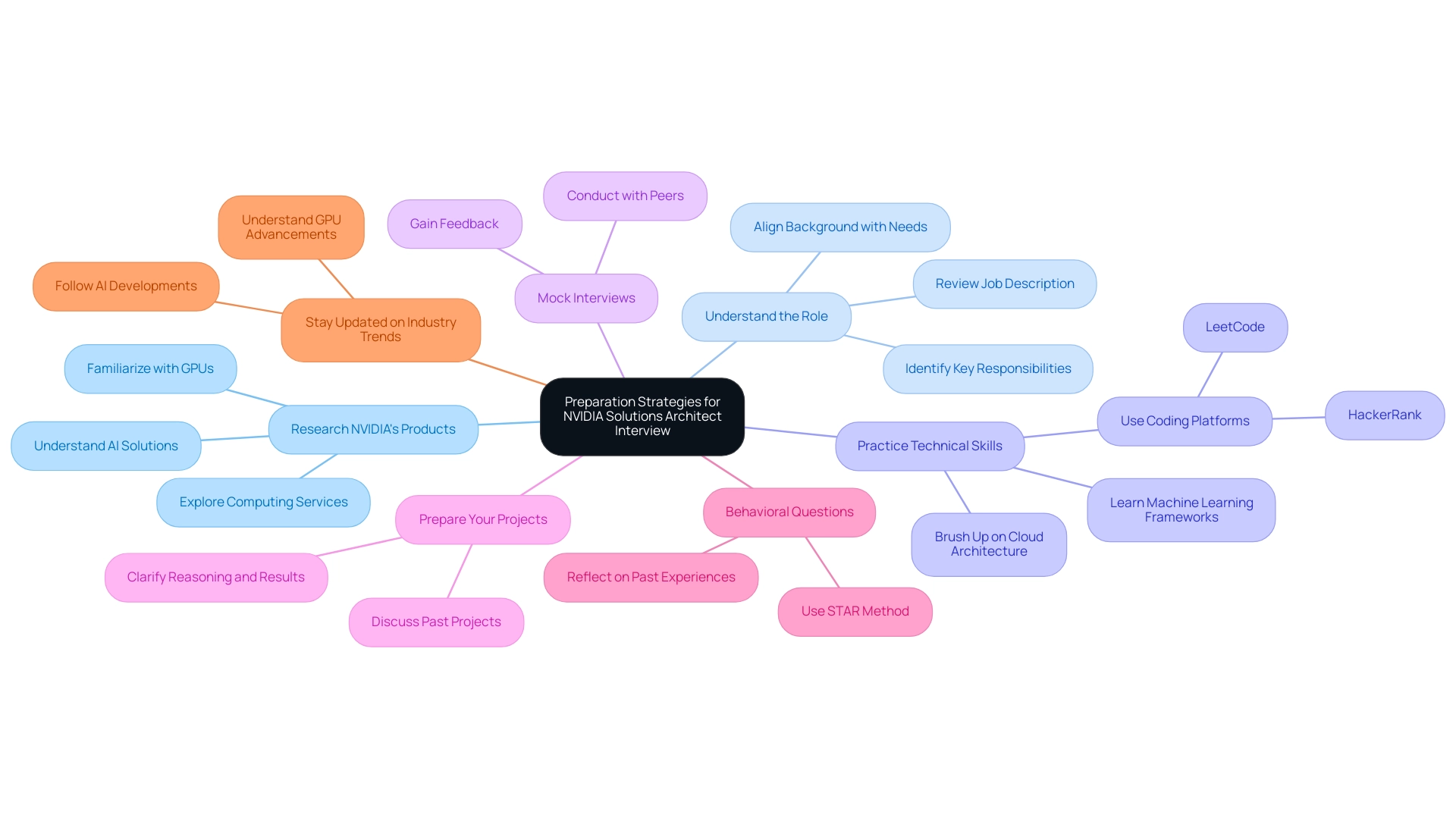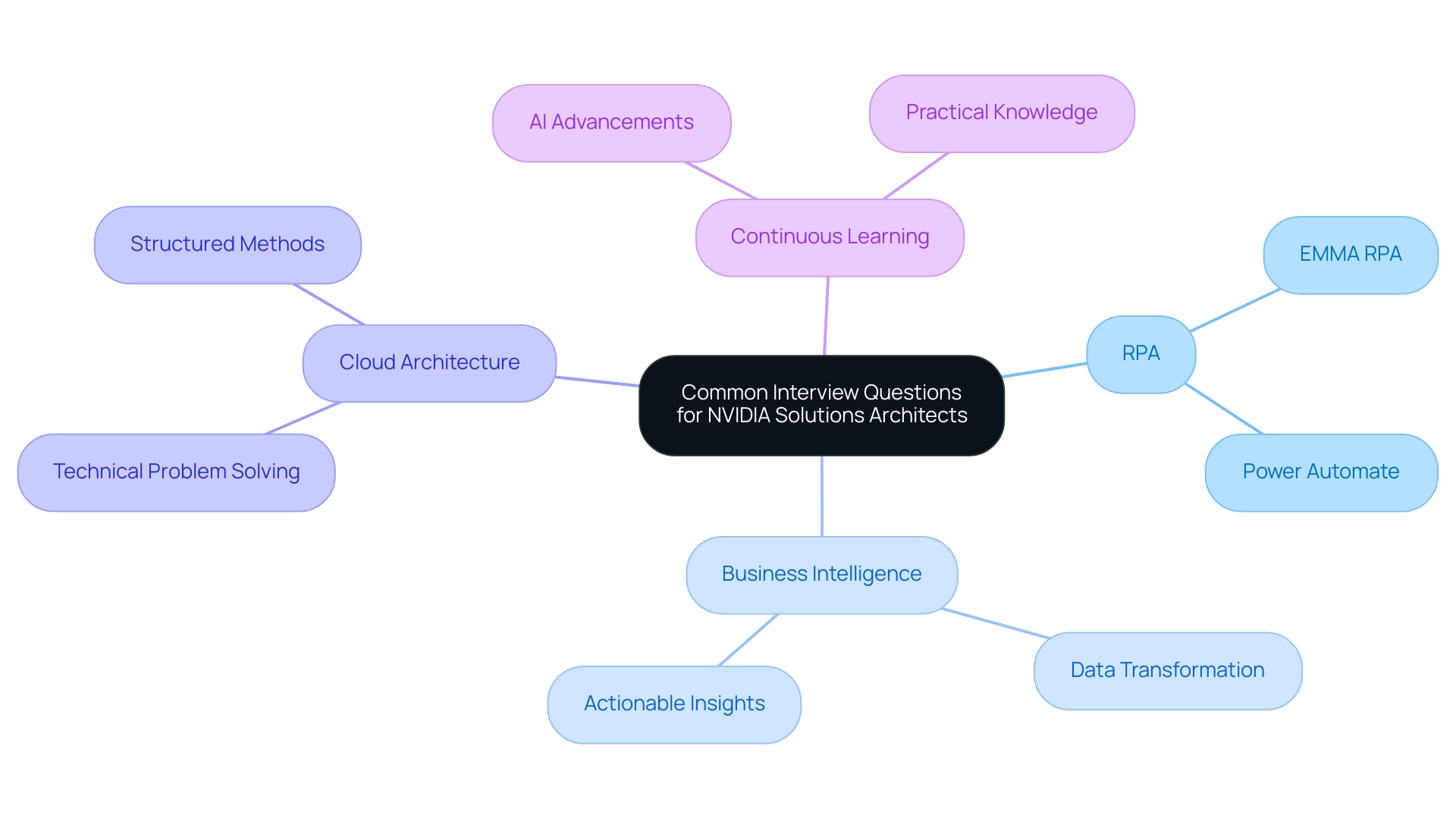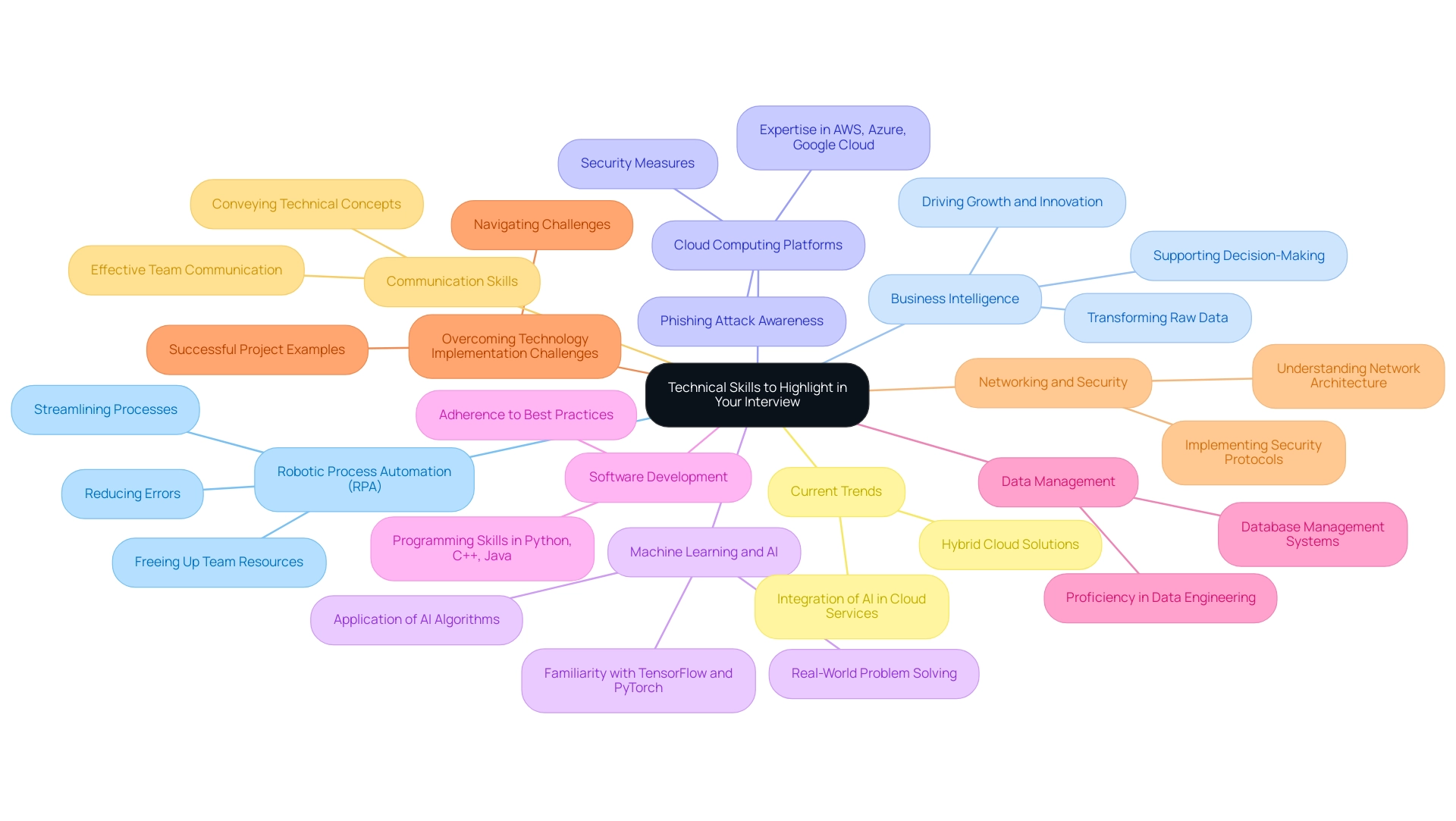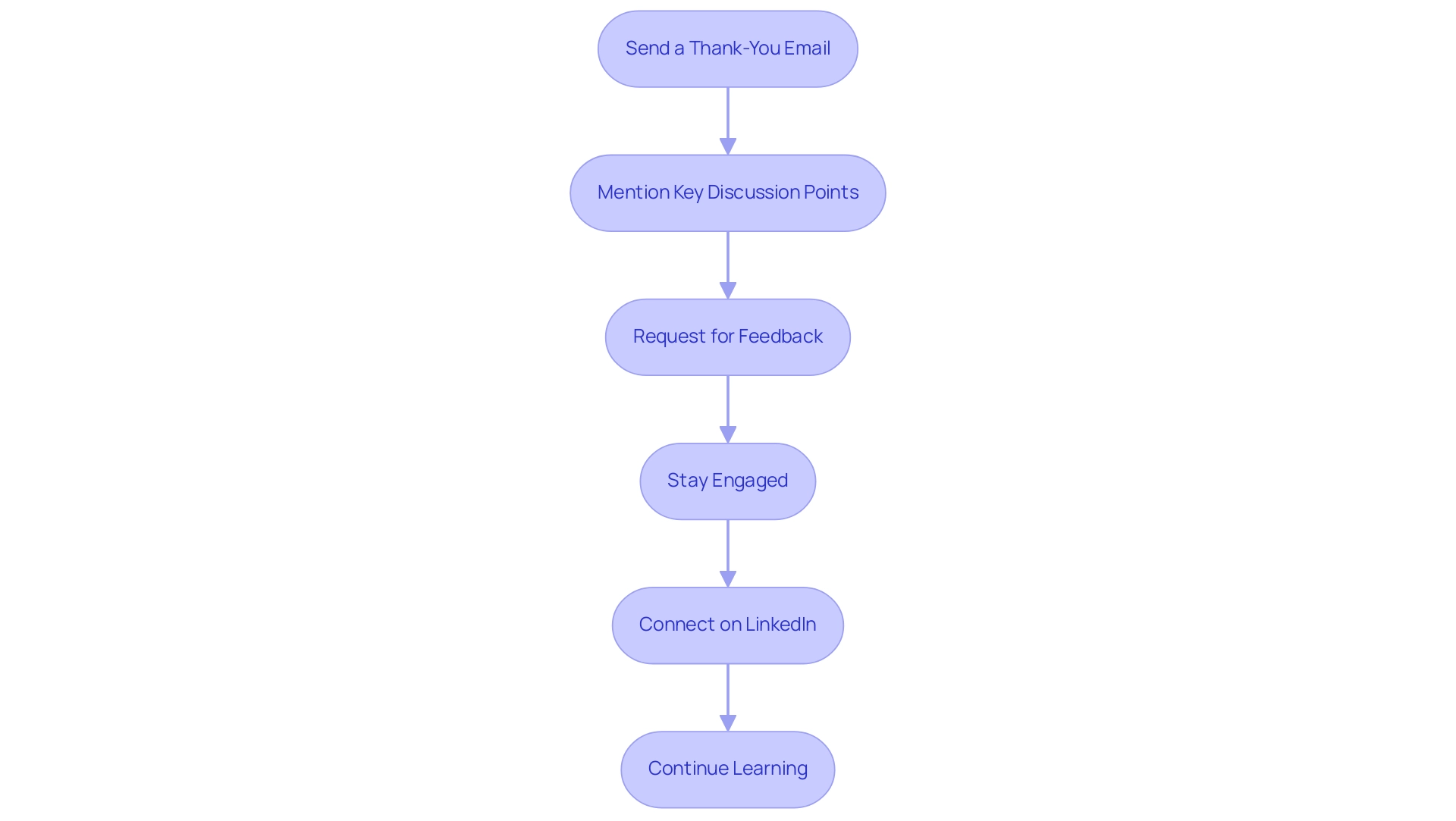Introduction
Navigating the competitive landscape of technology interviews can be daunting, particularly for aspiring NVIDIA Solutions Architects. As organizations increasingly rely on AI and cloud solutions to drive innovation, candidates must not only showcase their technical prowess but also articulate how their skills can address real-world business challenges. This article provides essential preparation strategies, common interview questions, and key technical skills to highlight, empowering candidates to present themselves as valuable assets in the ever-evolving tech ecosystem.
By equipping themselves with the right knowledge and insights, candidates can confidently approach their interviews, transforming opportunities into successful career advancements.
Essential Preparation Strategies for Your NVIDIA Solutions Architect Interview
To excel in your NVIDIA Solutions Architect assessment and effectively navigate the overwhelming AI landscape, consider the following preparation strategies:
-
Research NVIDIA’s Products and Technologies: Familiarize yourself with NVIDIA’s product lineup, including GPUs, AI solutions, and computing services. Grasping these technologies will not only equip you for the discussion but also assist you in expressing how these solutions can generate data-driven insights for businesses.
-
Understand the Role: Review the job description carefully and identify the key responsibilities and skills required. Tailor your preparation to demonstrate how your background aligns with these needs, emphasizing your understanding of how tailored AI solutions can address specific business challenges.
-
Practice Technical Skills: Brush up on technical skills relevant to the position, such as cloud architecture, machine learning frameworks, and software development principles. Use platforms like LeetCode or HackerRank to practice coding problems, ensuring that your skills reflect the capabilities necessary for leveraging Business Intelligence and RPA in operational efficiency.
-
Mock Interviews: Conduct mock interviews with peers or mentors who possess knowledge in technical interviews. This practice will help you refine your answers and gain feedback on your performance, particularly in how you can apply your knowledge of AI solutions to real-world scenarios.
-
Prepare Your Projects: Be ready to discuss your past projects, specifically how you utilized NVIDIA technologies or similar solutions. Get ready to clarify your reasoning, obstacles encountered, and results attained, connecting these instances to how they can aid Business Intelligence initiatives.
-
Behavioral Questions: Prepare for behavioral questions by using the STAR (Situation, Task, Action, Result) method to structure your responses. Reflect on your past experiences and how they relate to the competencies required for the role, especially in the context of driving data-driven insights.
-
Stay Updated on Industry Trends: Keep abreast of the latest trends in AI and GPU advancements. Referencing current developments in your discussion can showcase your passion and dedication to the field, along with your understanding of how these trends influence business efficiency and decision-making.

Common Interview Questions for NVIDIA Solutions Architects
In the context of AI Consulting Services, Directors of Operations Efficiency can leverage Robotic Process Automation (RPA) to automate manual workflows effectively. By streamlining operations, RPA not only enhances efficiency but also significantly reduces errors, allowing teams to focus on strategic tasks that drive business growth.
However, it is essential to recognize that overcoming technology implementation challenges is crucial in this process. Tailoring AI solutions and utilizing Business Intelligence can transform raw data into actionable insights, empowering informed decision-making. Specific tools such as EMMA RPA and Power Automate can play a pivotal role in this transformation.
During an NVIDIA Solutions Architect assessment, candidates should prepare to discuss their practical knowledge of cloud architecture, tackle challenging technical problems using structured methods, and showcase their continuous learning in AI advancements—all crucial for contributing to operational success.

Technical Skills to Highlight in Your Interview
When preparing for your NVIDIA Solutions Architect interview, consider emphasizing the following technical skills:
-
Robotic Process Automation (RPA): Discuss your experience with RPA tools and their role in streamlining processes and enhancing operational efficiency. Highlight how RPA can automate manual workflows, reduce errors, and free up your team for more strategic tasks—an essential consideration as businesses increasingly rely on technology for productivity.
-
Business Intelligence: Emphasize the importance of Business Intelligence in transforming raw data into actionable insights. Discuss how effective data management can support informed decision-making, driving growth and innovation in your organization.
-
Cloud Computing Platforms: Mastery of computing platforms such as AWS, Azure, or Google Cloud is vital. With a 51% rise in phishing attacks hosted at subdomain providers, your expertise in architecture and deployment, combined with a solid understanding of security measures, will be crucial in safeguarding digital assets. As Ronald Reagan famously said, ‘Trust, but verify,’ which underscores the importance of ensuring security in cloud environments.
-
Machine Learning and AI: Familiarity with machine learning frameworks like TensorFlow and PyTorch, along with AI algorithms, is indispensable. Current trends indicate a growing reliance on AI to enhance business processes. Demonstrate your expertise by discussing projects where these tools were applied to solve real-world problems.
-
Software Development: Robust programming skills in languages such as Python, C++, or Java are essential. Highlight your software development background and adherence to best practices, ensuring reliability and efficiency in your solutions.
-
Data Management: Proficiency in data engineering, data pipelines, and database management systems (e.g., SQL, NoSQL) is critical. Showcase your ability to effectively manage and utilize data, which is increasingly important in optimizing operations and supporting informed decision-making.
-
Overcoming Technology Implementation Challenges: Discuss your experience in navigating and overcoming challenges associated with technology implementation. Including examples of successful projects where you addressed these challenges can demonstrate your problem-solving skills.
-
Networking and Security: A profound comprehension of network architecture, security protocols, and best practices is advantageous, especially in virtual environments. Emphasize your role in implementing security measures to protect against potential threats.
-
Communication Skills: As a Solutions Architect, conveying complex technical concepts to non-technical stakeholders is crucial. Highlight your ability to communicate effectively across diverse teams, ensuring everyone is aligned and informed.
-
Current Trends: Stay informed about the latest trends in computing and machine learning, as these areas are rapidly evolving and are critical for Solutions Architects in 2024. For instance, the shift towards hybrid cloud solutions and the integration of AI capabilities into cloud services are shaping the future of technology.
Incorporating these skills into your preparation will not only demonstrate your technical prowess but also your capacity to contribute to the evolving landscape of work and technology. Additionally, consider referencing case studies that highlight successful implementations of these skills in real-world scenarios, further solidifying your expertise.

Post-Interview Follow-Up Strategies
After your NVIDIA Solutions Architect meeting, consider these follow-up strategies:
-
Send a Thank-You Email: Within 24 hours of your meeting, send a personalized thank-you email to each interviewer. Express your gratitude for the opportunity and reiterate your enthusiasm for the role. As Barack Obama once reflected, ‘The world is complicated, Bar. That’s why it’s interesting.’ This underscores the value of showing appreciation and engagement in the intricate process of job applications. Thank-you emails have been shown to significantly improve candidates’ chances of receiving positive feedback, making them an essential step in the follow-up process.
-
Mention Key Discussion Points: In your email, reference specific topics talked about during the meeting. This not only reminds the interviewers of your conversation but also reinforces your qualifications and shows that you were actively listening and engaged. Establishing a framework for decision-making can help interviewers feel more at ease with their choices about candidates.
-
Request for Feedback: If suitable, kindly ask for input on your performance during the discussion. This demonstrates your commitment to improvement and can provide valuable insights. Just as President Obama relied on thorough processes and team trust during pivotal decisions, seeking feedback can help you refine your approach. Research indicates that candidates who seek feedback are often viewed more favorably by interviewers.
-
Stay Engaged: If you have not heard back after a week or two, consider sending a follow-up email inquiring about the status of your application. This shows your continued interest in the position and keeps you on the interviewer’s radar. Timely follow-ups can be likened to a commander requesting immediate troop deployment, emphasizing the importance of prompt actions in achieving desired outcomes.
-
Connect on LinkedIn: If you haven’t already, connect with your interviewers on LinkedIn. This can help you maintain a professional relationship and keep you in mind for future opportunities. Building a network is crucial for long-term career success, especially in tech jobs where connections can lead to new opportunities.
-
Continue Learning: Regardless of the outcome, use the experience as a learning opportunity. Reflect on what went well and what could be improved for future discussions. Just as high-stakes decisions require reflection and learning, so too does the job search process. Engaging in this reflective practice can enhance your future interview strategies and overall effectiveness.

Conclusion
Thorough preparation is key to standing out in an NVIDIA Solutions Architect interview. By researching NVIDIA’s technologies, understanding the specific role, and honing relevant technical skills, candidates can effectively demonstrate their fit for the position. Practicing with mock interviews and preparing to discuss past projects will further enhance confidence and readiness.
Additionally, addressing common interview questions and articulating experiences in areas like Robotic Process Automation, Business Intelligence, and cloud computing will showcase the ability to contribute meaningfully to business goals. Emphasizing communication skills and the capacity to navigate technology implementation challenges will strengthen a candidate’s profile in the competitive landscape of tech interviews.
Finally, proactive post-interview strategies, such as sending thank-you notes and seeking feedback, can leave a positive impression and reinforce interest in the role. By implementing these strategies, candidates can transform the interview process into a powerful stepping stone towards a successful career in technology. Embracing this comprehensive approach will empower candidates to present themselves as invaluable assets in the evolving tech ecosystem.

